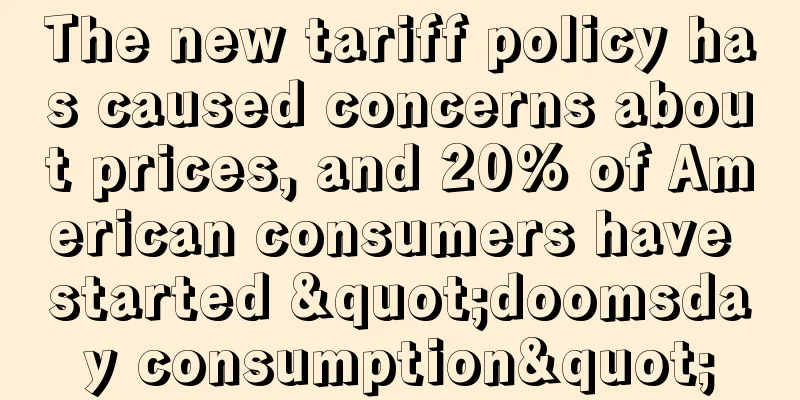The new tariff policy has caused concerns about prices, and 20% of American consumers have started "doomsday consumption"

|
Recently, according to foreign media reports, according to the latest report from Credit.Cards.com, one in five Americans said that out of concern for future events, they are engaging in so-called "doomsday consumption", that is, excessive purchases of goods to cope with possible price increases or recurrence of the epidemic. This consumption behavior reflects consumers' anxiety about future economic uncertainty, especially under the new tariffs implemented by President Trump and the possible impact of the epidemic. The survey shows that since November last year, a quarter of Americans have made large purchases due to concerns about the Trump administration's new tariffs, and 21% said they plan to make such purchases as soon as possible. For consumers who have purchased large items, the most common items include electronics (39%), household appliances (31%), and home improvement materials (25%). In addition, furniture (22%) and cars (17%) have also become major purchases. The report also pointed out that 30% of Americans said they were preparing for another possible epidemic, and 42% of respondents said they had begun to stockpile items, mainly food and toilet paper. Other common hoarding items include non-perishable food (76%), toilet paper (72%), medical supplies (49%) and over-the-counter drugs (44%). Some consumers also bought water filtration systems (21%), household goods or appliances (23%), and personal care products (25%). It is worth noting that more and more American consumers tend to use credit cards for shopping. 28% of consumers said they use credit cards for most of their purchases, 37% use credit cards for some of their purchases, and 35% do not use credit cards for their purchases. For those consumers who use credit cards, 34% said they may fall into credit card debt during their consumption this year to ensure that they can complete these large purchases. CreditCards.com expert John Egan said that although it is difficult to assess the specific impact of the Trump administration's new tariffs on consumer spending, these tariffs are likely to prompt some consumers to re-examine their purchasing habits, especially when it comes to purchasing major commodities. Overall, doomsday consumer behavior reflects the strong concerns of American consumers about future uncertainties. This trend not only affects their consumption patterns, but also changes the pattern of market demand to a certain extent. Experts warn that although the current increase in consumer spending may provide short-term economic stimulus, in the long run, this behavior may aggravate household debt problems and affect the stability of the consumer market. Author ✎ Rayna/ Statement: This article is copyrighted and may not be reproduced without permission. If you need authorization, please contact: happy |
<<: 13,000 dryers sold on Amazon and other platforms have been recalled! There is a fire hazard
Recommend
6 predictions for Amazon advertising in 2020
Amazon sellers have had another tough year. In 20...
FedEx launches the 10th Small Seller Competition! The prize pool is as high as $360,000!
FedEx recently announced the launch of its 10th an...
What is Listingmirror? Listingmirror Review
Listingmirror is a tool that can publish listings,...
What is AQData? AQData Review
AQData is a free one-stop intelligent analysis and...
From Amazon to multiple platforms, a large number of sellers are continuing to explode!
text Recently, Amazon has continued to ban accoun...
Last 30 days! US trademark prices are about to increase
On June 19, 2020, the United States Patent and Tra...
What is Cyfe? Cyfe Review
Cyfe is an analysis tool that brings together all ...
What is AdRoll? AdRoll Review
AdRoll is a technology company that provides retar...
Effective new product advertising strategies on Amazon that you don’t know!
text Week 1 Play 3 groups of automatic ads A grou...
What is the Chengdu Cross-border E-commerce Association? Chengdu Cross-border E-commerce Association Review
Chengdu Cross-border E-commerce Association offici...
The closure of the store was a mistake? Amazon confirmed
Since the outbreak of the epidemic, not only have ...
What is transit tariff? Transit tariff review
Transit Duties, referred to as "transit taxes...
Snapchat is launching new tools to combat illegal drug sales on its platform!
<span data-shimo-docs="[[20,"社交电商Snapchat正...
What is LGS (Lazada Global Shipping)? LGS (Lazada Global Shipping) Review
LGS (Lazada Global Shipping) is a global logistics...
Shopify teams up with Google Cloud to improve search for online stores
It is learned that according to foreign media repo...









